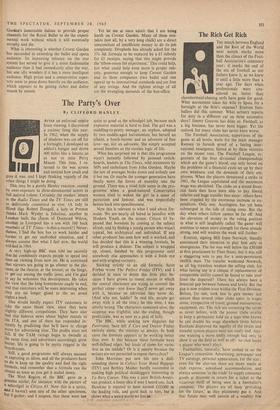The Party's Over
By CLIFFORD HANLEY
AFTER an enforced respite from viewing, I discovered
a curious thing this year.
In 1962, when the supply of shadows was cut off for a fortnight, I developed an addict's hunger and drove 400 miles like a lunatic so as not to miss Perry Mason. This time, I re- turned to the wee screen and noticed how small and grey it was, and I kept thinking vaguely of the other things I might be doing.
This may be a purely Hanley reaction, caused by over-exposure to three-dimensional actors in full natural colour. Certainly the readers' letters
in the Radio Times and the TV Times are still as deliriously committed as ever. (A lady in
Ilford digs Robert Dougall, a lady in Preston thinks Mark Wynter is fabulous, another in London hails the charm of Desmond Wilcox.
another in Liverpool has a son with 160 back
numbers of TV Tinies—is-this-a-record'?) Never- theless, I" find the box has to work harder and
harder to get my undivided attention, and I always assume that what I feel now, the world will feel in 1964.
A very high-up BBC man told me recently that he confidently expects people to' spend less time on viewing from now on. He is convinced that viewers are going to go oftener to the pic- tures, or the theatre, or the boozer, or the bingo, or get out among the traffic jams; and I'm glad
to say he welcomes this development. He takes the view that the long honeymoon ought to end,
and that customers will be more interesting when they are no longer glued to the set seven nights a week.
One would hardly expect ITV customers to take the same bland view, since they have slightly different compulsions. They have also had this• hideous news about higher rentals to the ITA, and one of them has responded in- stantly by predicting that he'll have to charge more for advertising time. The profits must not fall. If the TAM ratings begin to dwindle at the same time, and advertisers accordingly grow leerier, life is going to be' pretty 'rugged in the boardrooms.
Still, a good programme will always succeed in capturing us idiots, and all the producers have to do is keep up the quality and find the right formula, and remember that a formula can die almost as soon as you get it nailed down.
The West Region of the BBC gave us a genuine sizzler, for instance, with the picture of a schoolgirl in Citizen 63. Now this is a series, and I haven't seen any of the other specimens, but I gather, and I suspect, that these were not
quite so good as the schoolgirl job, because such explosive material is hard to find. The girl was a middling-to-pretty teenager, an orphan, adopted by two middle-aged Salvationists, but herself an atheist, a bomb-banner and an advocate of free love—no, not an advocate. She simply accepted sexual freedom as the routine logic of life.
What has surprised me is that this programme wasn't instantly followed by jammed switch- boards, leaders in The Times, wild statements by MPs and embolisms from John Gordon. Maybe the law of averages broke down and nobody saw it but me. Or maybe the younger generation have finally worn the forces of morality into the ground. There was a vivid little scene in the pro- gramme when a good-natured Conservative woman tried to waken the girl to a sense of patriotism and honour, and was respectfully beaten back into speechlessness.
Now this is relevant 46 what I said about for- mat. We are nearly all bored to jaUndice with Modern Youth on the screen. Citizen 63 by- passed that boredom' by coming at the subject afresh, and by finding a young person who wasn!t typical, but archtypical and individual. If any other producer has seen how well it worked, and has decided that this is a winning, formula, he will produce a disaster. The subject is wrapped up, closed, finished by this programme until somebody else approaches it with al' fresh eye and with original curiosity., Sticking strictly to an old formula, Scott Forbes wrote The Perfect Friday (ITV), and I decided' at once to detest this little play be- cause I have grown to resent stories in which the central characters are trying to commit the perfect trirne-7you know they'll never, get away with it, because on television they 'never do. (And why not, laddie? In real life, people get away with it all the time:) So this time, I was utterly wrong. The characters remained alive, the suspense was frightful, and the ending, though predictable, was as neat as .a peal of bells.
The BBC, while seeking new disguises for Panorama, have left Z Cars and Doctor Finlay entirely alone, the mixture as always. In both cases the formula appears to' be working better than ever. Is this because these formulx have well-defined edges, but loads' of room for varia-. lion in the middle? Or is it merely because the writers are not permitted to repeat themselves?
John Mortimer put new life into a dull- sounding theme in Collect Your Hand Baggage (ITV) and Berkley Mather hardly succeeded in making high political skulduggery interesting in To Bury Caesar. This was a joint British-Ameri- can product, a lousy idea if ever I heard one. Jack Hawkins is reputed to have earned £10,000 in the leading role, and good luck to him, but it shows N'hat a weird world we live in.






































 Previous page
Previous page